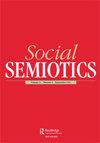Banksy’s Walled Off Hotel and the mediatization of street art
IF 1.2
2区 文学
Q2 COMMUNICATION
引用次数: 6
Abstract
ABSTRACT This article offers a critical semiotic analysis of the media discourses about Banksy’s Walled Off Hotel in Bethlehem. Unlike the existing burgeoning scholarship on this tourist initiative, the article focuses less on the space of the hotel itself and the street art therein than on their mediatization. With the help of the notion of mediatization, the article offers a granular account of the discursive circulation of Banksy’s street art assemblage, with the concomitant processes of social value formation as well as the ambivalent array of moral and affective components involved in such valorization. The mediatization of Banksy’s street art in Palestine interpellates visitors by affectively and morally enticing them to have a first-hand experience of the Israeli/Palestinian conflict, namely consuming its mediatized object par excellence, the graffitied wall and/or its reproduction. Less enthusiastic uptakes instead take issue with the affective logic upon which such mediatization seems to be built.班克斯的《围墙旅馆》和街头艺术的媒介化
摘要:本文对媒体关于班克西在伯利恒的“封城酒店”的话语进行了批判性的符号学分析。与现有的关于这一旅游倡议的新兴学术不同,这篇文章关注的不是酒店本身的空间和其中的街头艺术,而是它们的中介作用。借助中介化的概念,本文对班克西街头艺术组合的话语循环、伴随而来的社会价值形成过程以及这种价值化所涉及的道德和情感成分的矛盾阵列进行了细致的描述。班克西街头艺术在巴勒斯坦的调解通过情感和道德上引诱游客亲身体验以色列/巴勒斯坦冲突,即消费其调解对象、涂鸦墙和/或其复制品,来激发游客的兴趣。相反,不那么热情的吸收者对这种中介作用所基于的情感逻辑提出了质疑。
本文章由计算机程序翻译,如有差异,请以英文原文为准。
求助全文
约1分钟内获得全文
求助全文

 求助内容:
求助内容: 应助结果提醒方式:
应助结果提醒方式:


